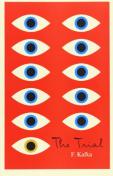BKMT READING GUIDES
The Trial
by Franz Kafka
Paperback : 304 pages
2 clubs reading this now
2 members have read this book
Introduction
Written in 1914, The Trial is one of the most important novels of the twentieth century: the terrifying tale of Josef K., a respectable bank officer who is suddenly and inexplicably arrested and must defend himself against a charge about which he can get no information. Whether read as an existential tale, a parable, or a prophecy of the excesses of modern bureaucracy wedded to the madness of totalitarianism, Kafka's nightmare has resonated with chilling truth for generations of readers. This new edition is based upon the work of an international team of experts who have restored the text, the sequence of chapters, and their division to create a version that is as close as possible to the way the author left it.
In his brilliant translation, Breon Mitchell masterfully reproduces the distinctive poetics of Kafka's prose, revealing a novel that is as full of energy and power as it was when it was first written.
Editorial Review
The story of The Trial's publication is almost as fascinating as the novel itself. Kafka intended his parable of alienation in a mysterious bureaucracy to be burned, along with the rest of his diaries and manuscripts, after his death in 1924. Yet his friend Max Brod pressed forward to prepare The Trial and the rest of his papers for publication. When the Nazis came to power, publication of Jewish writers such as Kafka was forbidden; Kafka's writings, many of which have distinctively Jewish themes, did not find a broad audience until after World War II. (Hannah Arendt once observed that although "during his lifetime he could not make a decent living, [Kafka] will now keep generations of intellectuals both gainfully employed and well-fed.") Among the current crop of Kafka heirs is Breon Mitchell, the translator of this edition of The Trial. Rather than tidying up Kafka's unconventional grammar and punctuation (as previous translators have done), Mitchell captures the loose, uneasy, even uncomfortable constructions of Kafka's original story. His translation technique is the only way to convey the comedy and confusion of this narrative, in which Josef K., "without having done anything truly wrong," is arrested, tried, convicted and executed--on a charge that is never disclosed to him. --Michael Joseph GrossDiscussion Questions
No discussion questions at this time.Book Club Recommendations
Recommended to book clubs by 1 of 1 members.
Book Club HQ to over 88,000+ book clubs and ready to welcome yours.
Get free weekly updates on top club picks, book giveaways, author events and more








